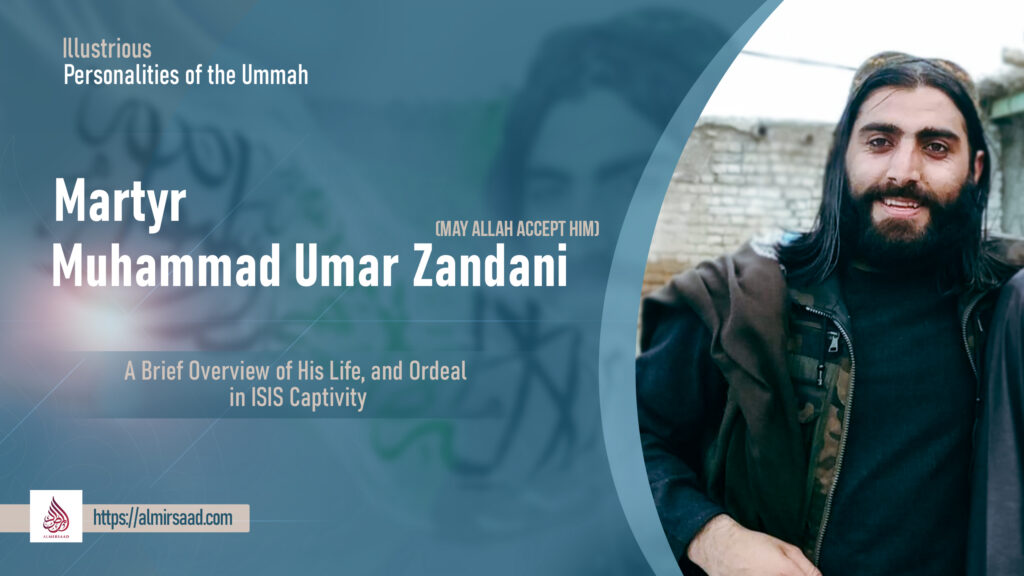Illustrious Personalities of the Ummah
Martyr Muhammad Umar, son of Haji Wazir and grandson of Haji Maink, was born in 1998 in the village of Dashti Bahari, near the provincial capital of Logar. From an early age, he was drawn to the jihadist fronts, dedicating his summers to the battlefield and his winters to the pursuit of education.
In 2018, he enrolled at Jamia Muhammadiyah in the Syaf Family of Nangarhar’s capital. However, before formal classes could commence, driven by an unyielding passion for jihad, he embarked on foot alongside three companions, setting out for the frontlines. En route, near Chaparhar district, the Daesh Khawārij apprehended them.
Days of Captivity:
Shaheed Zandani’s firsthand account of his ordeal is a harrowing testimony:
“Daesh and the American forces shared an eerie similarity in their methods. Upon our capture, Daesh immediately resorted to physical violence, showing no regard for age or dignity. Their treatment of us was deplorable, marked by severe deprivation of food—meals were sparse and often consisted of stale bread, sometimes withheld for weeks. In short, their conduct was devoid of humanity.
I had heard similar accounts from inmates in Bagram, who described how American forces inflicted similar hardships regarding food and interrogation methods. Analogous to ISIS, they would descend upon us in the dead of night, dragging us off for interrogation, probing us with relentless questioning. Our response remained consistent—we were merely students of a madrasa. The majority of the interrogators were foreigners: Russians, Uzbeks, and Punjabis, with the participation of Afghans being infrequent.
One of the most significant injustices was the prohibition of the Salāh for ten days and nights, during which we had to resort to praying through gestures alone.
Subsequently, they informed us that a ‘Shar’ī Dars’ would commence, which was held thrice daily. This so-called Dars was nothing more than a façade, consisting solely of selected hadiths and scornful refutations of the four major Islamic schools of thought. Over the six months of captivity, we were repeatedly subjected to the psychological terror of being dressed in red garments, symbolizing our impending execution, only for the moment to pass.
Astonishingly, in the final days, the Khawārij were subjected to relentless bombardment, which even brought down half the wall of our cell. When I finally emerged from their clutches following their defeat, it was clear that those swayed by their propaganda were often the very ones caught in these attacks. Daesh cynically used these bombings and the resulting civilian casualties to further their narrative, claiming that such assaults proved the righteousness of their cause.
After six harrowing months, my family journeyed to Chaparhar and enlisted local elders as mediators to negotiate our release from Daesh. Ultimately, they agreed to free us in exchange for 125,000 Afghanis per person.
One of Zandani’s companions recounted a night at Jamia Haqqania’s hostel when he was roused by the sound of weeping. Upon investigating, he found Zandani in deep supplication before Allah, beseeching for martyrdom with tearful eyes.
In the end, his fervent prayer was granted. A month before the Fatah, he, along with two companions, attained martyrdom during an intense confrontation with Afghan commandos in Wazir Kala Town, Logar. May Allah accept him, and Allah alone is his reckoner.
Another of Zandani’s companions narrated a miraculous escape: One night, American forces stormed his home. The following day, we visited him, only to find Zandani and his cousin Sultan Muhammad Masoom (who was also martyred on the day of Logar’s victory) sitting serenely at home. When asked how they had evaded the Americans, Zandani, with a serene smile, revealed, “We were asleep on the rooftop. Upon sensing the raid, we began reciting Ayat al-Kursi, and by the grace of Allah, we remained unnoticed throughout the entire operation.”
